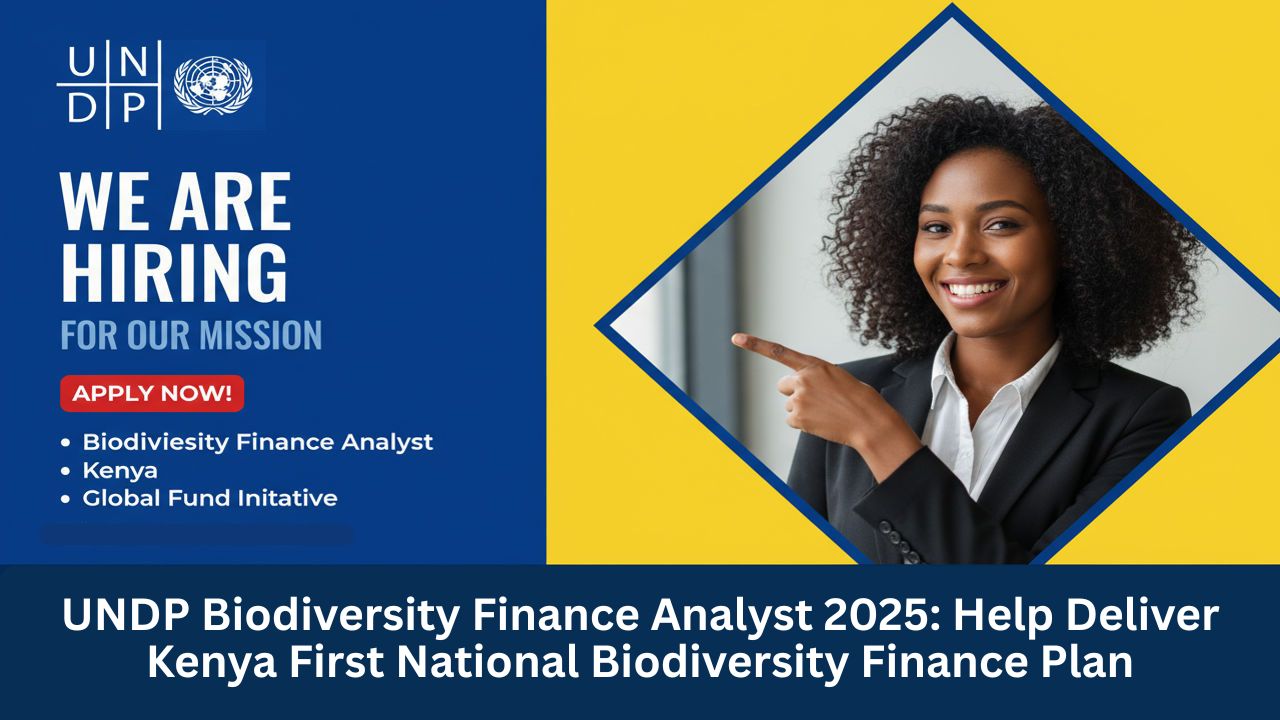The United Nations Development Programme seeks a Biodiversity Finance Analyst to support Kenya landmark National Biodiversity Finance Plan under the GEF8 Umbrella Programme. Based in Nairobi on a one-year NPSA-9 contract, you will produce the Biodiversity Expenditure Review, complete a Financial Needs Assessment, and help shape a practical Biodiversity Finance Plan that mobilizes resources for nature and communities. This role is ideal for finance and economics professionals who understand environmental policy, can manage complex datasets, and can translate analysis into actionable financing solutions.
UNDP Biodiversity Finance Analyst 2025 Quick Summary Table
Item |
Details |
|---|---|
Role |
Biodiversity Finance Analyst |
Contract |
NPSA-9, 1 year, renewable subject to performance and funds |
Duty station |
Nairobi, Kenya |
Practice area |
Nature, Climate and Energy |
Core outputs |
Biodiversity Expenditure Review, Financial Needs Assessment, inputs to Biodiversity Finance Plan |
Reports to |
BIOFIN National Coordinator |
Application deadline |
7 November 2025 |
Official site |
About UNDP and the assignment
UNDP is the UN lead agency for sustainable development, working with governments, civil society, and private actors to achieve the SDGs. Within the Nature, Climate and Energy Practice, UNDP advances biodiversity and climate goals by strengthening policy, mobilizing finance, and enabling nature-based solutions. The Biodiversity Finance Initiative, commonly known as BIOFIN, helps countries identify where biodiversity money currently flows, what is needed to meet national targets, and which finance mechanisms can close the gap. Kenya first National Biodiversity Finance Plan will align with the Kunming-Montreal Global Biodiversity Framework and provide a practical roadmap for Target 19 on resource mobilization.
What you will do: key responsibilities
1) Biodiversity Expenditure Review
- Map and compile public, private, and development partner spending relevant to biodiversity using BIOFIN typologies.
- Design and execute a BER work plan, including data requests to ministries, agencies, counties, parastatals, and non-state actors.
- Classify, clean, and analyze expenditures to determine biodiversity relevance and trend lines.
- Produce an evidence-based BER report and facilitate validation with stakeholders.
2) Financial Needs Assessment
- Review Kenya NBSAP and sector strategies to list priority actions and cost drivers.
- Engage focal points in environment, agriculture, water, forestry, wildlife, tourism, and finance to define costed activities.
- Estimate total financing needs and quantify the gap between needs and current flows.
- Finalize the FNA with assumptions, scenarios, and sensitivity checks.
3) Biodiversity Finance Plan support
- Translate BER and FNA findings into a prioritized set of finance solutions and enabling policy options.
- Contribute to feasibility analysis for instruments such as budget tagging, fiscal reforms, green bonds, PES, biodiversity offsets, blended finance, and risk-sharing facilities.
- Draft implementation pathways, governance arrangements, and an M&E outline for the plan.
4) Outreach, knowledge, and reporting
- Prepare technical briefs, slide decks, and data visualizations for workshops and consultations.
- Document methods, decisions, and lessons to inform future iterations and replication.
- Contribute to BIOFIN and UNDP knowledge platforms with Kenya case studies.
What success looks like
- A validated BER with defensible classifications and clear insights on who spends what, where, and with what biodiversity relevance.
- An FNA that credibly estimates costs to achieve national targets and clarifies the financing gap.
- Practical inputs to a Biodiversity Finance Plan that Kenya can begin implementing with government, private sector, and development partners.
- Strong, collaborative relationships across ministries, counties, civil society, and business, enabling data sharing and follow-through.
Candidate profile
Minimum qualifications
- Master degree in Finance, Economics, Business Management, Environmental Economics, or a related field. A bachelor degree plus four years of relevant experience may be considered.
- Two or more years of experience for master holders or four or more years for bachelor holders in environmental finance, public finance, accounting, or economic analysis.
Technical strengths
- Financial analysis, budget classification, and expenditure tracking.
- Costing of policy actions and program budgets; gap analysis.
- Data storytelling and visualization for decision makers.
- Understanding of biodiversity policy, NBSAPs, and nature finance instruments.
- Clear technical writing for reports and policy briefs.
Cross-functional competencies
- Stakeholder facilitation and coalition building.
- Systems thinking that connects ecological goals with fiscal and regulatory levers.
- Results orientation under tight timelines with meticulous attention to data quality.
- Excellent English communication skills.
What you will work on in your first 90 days
- Confirm scope, stakeholders, and data templates for BER; issue formal data requests.
- Build a consolidated expenditure database and pilot a classification sample for validation.
- Draft the FNA approach note with costing methods and sector responsibilities.
- Establish a light dashboard for weekly progress checks and risk tracking.
- Schedule consultations and a validation calendar aligned to government cycles.
How to apply
- Prepare a concise CV highlighting finance analytics, public expenditure work, and nature finance exposure.
- Include a short cover letter explaining how you will deliver the BER and FNA and translate them into finance solutions.
- Submit through the UNDP careers portal for Kenya before 7 November 2025.
Selection and evaluation
Applications are reviewed for technical fit, experience with public finance and environmental economics, and ability to manage multi-stakeholder processes. Shortlisted candidates may be asked to complete a short analytical exercise and participate in a competency-based interview.
Why this role matters
Kenya biodiversity underpins agriculture, water security, tourism, and climate resilience. The BER and FNA establish a transparent baseline and a credible cost envelope so that fiscal policy, private capital, and international finance can be aligned with the country nature goals. Strong analysis now enables scalable finance solutions and durable conservation outcomes later.
Frequently asked questions
Is this a national or international role?
This is a National Personnel Service Agreement position based in Nairobi.
What contract level applies?
NPSA-9 for twelve months, renewable subject to performance and funding.
Which deliverables are mission critical?
A validated Biodiversity Expenditure Review, a Financial Needs Assessment with a quantified gap, and substantive inputs to the Biodiversity Finance Plan.
Do I need prior BIOFIN experience?
Direct BIOFIN experience is an advantage, but equivalent public finance, PFM, or environmental economics work is relevant if you can apply BIOFIN methodologies.
What stakeholder engagement is expected?
Regular coordination with environment and finance ministries, sector ministries, county governments, development partners, private sector platforms, and civil society.
What tools will I use?
Spreadsheet models for classification and costing, basic data visualization, and standard document templates. Familiarity with budget tagging and PFM systems is helpful.
For More Information Click Here










